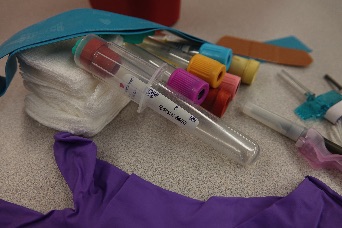Certificate in Phlebotomy
Phlebotomy Certificate
Phlebotomy Certificate GuidesheetWhat is a Phlebotomist?
A phlebotomist is a healthcare professional who collects blood samples from clients for laboratory analysis, for blood donation and transfusion, and for research. The phlebotomist generally works under the supervision of the Medical Laboratory Technologist.
A Phlebotomist....
- Requires individuals who can critically think, with attention to detail in order to maintain client safety, label specimens, complete paperwork and more.
- Must be compassionate and caring in fulfilling the duties required.
- Needs good hand to eye coordination, as this is necessary to fulfill the assigned
duties.

Where can I work as a phlebotomist?
- Hospital laboratories
- Commercial laboratories
- Physician offices and out-patient clinics
- Blood Banks
- Home Health Care Agencies
Program Options
Illinois Valley Community College’s Phlebotomy Program can be completed in sixteen weeks. Extenuating circumstances may lengthen the time needed to complete. After the completion of the required courses, the student will receive a Certificate in Phlebotomy from IVCC. After successful completion of ALH 1252, the student is eligible to sit for the national American Society for Clinical Pathology Board of Registry Certification Exam (ASCP). This certification allows for increased job mobility and wages across the country, and is sought after by potential employers.
Requirements to obtain a Phlebotomy Certificate
- Must be 18 years of age with a high school diploma or a GED to meet the qualifications to take the ASCP Certification exam.
- Students must complete ALH 1001 Medical Terminology as a pre or co-requisite for ALH 1252
- All students are required to have a criminal background check and pass a 10 panel urine drug screen before beginning the clinical portion of ALH 1252.
- A felony and certain misdemeanors may prohibit any individual from working in the healthcare field.
- A current (within one year of program start) two-step TB skin test is required for admission.
- Additional immunization verification, seasonal flu vaccine, and CPR may be required depending on the clinical site.
Features of the IVCC Phlebotomy Program
- Smaller class sizes. No large lecture halls.
- Phlebotomy instructors who have years of experience and are dedicated to the Phlebotomy Program at IVCC.
- Theory and Lab classes are taught on campus in classrooms that offer the technology and lab supplies needed to prepare the student to function proficiently at a clinical site.
- Multiple clinical sites are located throughout the IVCC district. Each student's clinical site is chosen through collaboration between the student, instructor, and manager at the clinical site.
Affordability
IVCC tuition is just one-third to one-fourth the cost of state universities and far
below most private institutions. An approximation of tuition and fees and cost comparison
can be found on the IVCC website at www.ivcc.edu/payment and at www.ivcc.edu/save.
Many scholarship opportunities are available through the IVCC Foundation at
www.ivcc.edu/foundation
Financial aid is not available for this certificate as it does not contain enough credit hours to meet Financial Aid's Federal Guidelines.
Where can I go from here?
If you hold a phlebotomy certificate, your next step would be to obtain your Medical Lab Technology Degree. This is a Bachelor's Degree that would allow you to perform complex analysis of body fluids and tissues, automated and manual testing, and supervise lab technicians and phlebotomists. To pursue a Medical Lab Technology Degree you will need a strong background in maths and sciences. IVCC offers several classes that will transfer to a 4-year institution including: Biology, Chemistry, Physics, a multitude of math classes and Microbiology.
Phlebotomy Program Contacts
Kelli Shan
